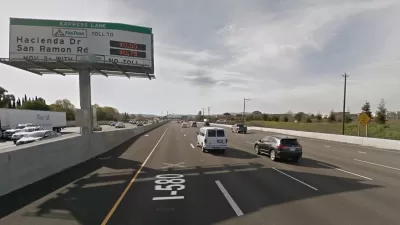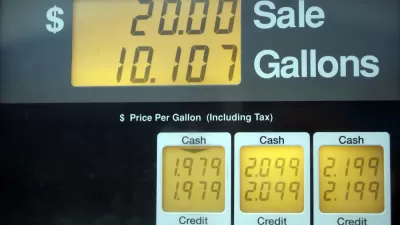$15 million in a U.S. Department of Transportation grant program is now available for states to implement pilot projects based on a "user-based alternative revenue mechanism," aka vehicle-miles-traveled fee.
As most Planetizen readers know, Congress has chosen to continue the transportation funding practice, first begun in 2008, of transferring tens of billions of dollars from the General Fund to the Highway Trust Fund, though now they use what can best be described as gimmicks (also known as "pay-fors") to offset the transfers.
The largest such transfer, $70 billion, resulted from the passage of the 5-year, transportation bill, Fixing America's Surface Transportation Act or "FAST Act" last December. It was "paid-for" by selling oil in the Strategic Petroleum Reserves, liquidating a Federal Reserve surplus account, et.al., as noted earlier.
But what Congress also did was to include funding for states to essentially do what Congress couldn't or wouldn't do. No, I refer not to increasing the federal gas tax, but to paving the path toward a sustainable funding mechanism, the vehicle-miles-traveled (VMT) fee, which is immune from increases in vehicle fuel efficiency, and the shift, even if slow, to electric vehicles.
A Federal Highway Administration (FHWA) press release Tuesday announced the availability of grants in 2016, year one of the 5-year, $95 million Surface Transportation System Funding Alternatives (STSFA) grant program.
The U.S. Department of Transportation's Federal Highway Administration today announced $15 million in grants for states under a new program to test alternative revenue mechanisms to help sustain the long-term solvency of the Highway Trust Fund.
Fiscal year 2016 2017 2018 2019 2020 Authorization $15 M
$20 M
$20 M
$20 M
$20 M
Credit: FAST Act.
For the most part, that means adopting vehicle-miles-traveled (VMT) fee pilot programs like the California Road Charge Pilot that will begin this July, or the two pilots that preceded the OReGO program. However, don't expect to see "VMT fee." Instead, the program refers to "user-based alternative revenue mechanism," as if we didn't have enough terms to describe being charged for how much you drive as opposed to how much gas you burn.
"This program will take technological innovation to a new level and help to make the entire transportation network more reliable for commuters, businesses, and freight shippers," said U.S. Transportation Secretary Anthony Foxx in the press release.
However, Ben Miller, staff writer for Government Technology and FutureStructure, points to "a catch — the administration will only fund projects that can help out the Highway Trust Fund."
“The mechanism would ultimately need to demonstrate that it could effectively collect federal user fee revenue and be scalable nationally, but it could also be used to collect state user fee revenue,” Transportation Department spokesperson Nancy Singer wrote in an email. “It should be noted that during the demonstration, federal user fee revenue would not actually be collected; rather, the pilot approach would demonstrate how it could be collected.”
"The grants are only available to states or groups of states," notes the press release, thus groups like the Western Road Usage Charge Consortium would be eligible. See Bruce Melzer's extensive piece in Toll Road News last April on progress made by some of the members [see member map (PDF)]
Hat tip to AASHTO Daily Transportation Update.
FULL STORY: U.S. DOT Annouces First Year of Grant Funding for State VMT Fee Pilot Programs

Maui's Vacation Rental Debate Turns Ugly
Verbal attacks, misinformation campaigns and fistfights plague a high-stakes debate to convert thousands of vacation rentals into long-term housing.

Planetizen Federal Action Tracker
A weekly monitor of how Trump’s orders and actions are impacting planners and planning in America.

Chicago’s Ghost Rails
Just beneath the surface of the modern city lie the remnants of its expansive early 20th-century streetcar system.

Bend, Oregon Zoning Reforms Prioritize Small-Scale Housing
The city altered its zoning code to allow multi-family housing and eliminated parking mandates citywide.

Amtrak Cutting Jobs, Funding to High-Speed Rail
The agency plans to cut 10 percent of its workforce and has confirmed it will not fund new high-speed rail projects.

LA Denies Basic Services to Unhoused Residents
The city has repeatedly failed to respond to requests for trash pickup at encampment sites, and eliminated a program that provided mobile showers and toilets.
Urban Design for Planners 1: Software Tools
This six-course series explores essential urban design concepts using open source software and equips planners with the tools they need to participate fully in the urban design process.
Planning for Universal Design
Learn the tools for implementing Universal Design in planning regulations.
planning NEXT
Appalachian Highlands Housing Partners
Mpact (founded as Rail~Volution)
City of Camden Redevelopment Agency
City of Astoria
City of Portland
City of Laramie




























